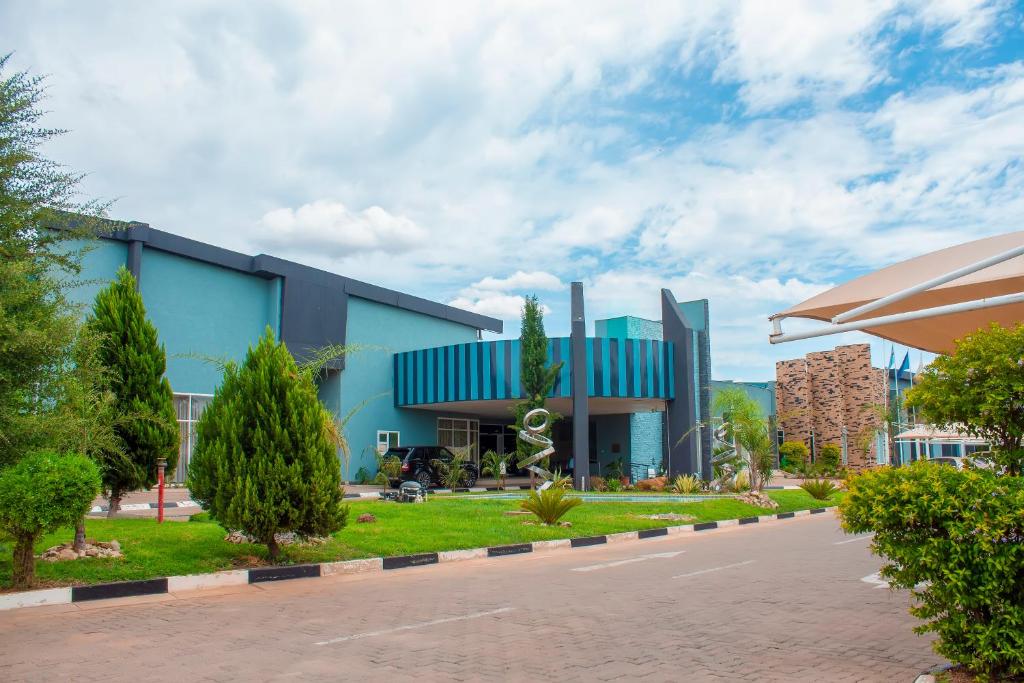Esta página ha sido traducida de manera automática y puede contener errores

Visualizing Data in DHIS2
The HISP groups of Uganda, Tanzania, Kenya, Rwanda, Zimbabwe and Malawi invite you to join this Academy, which will provide you with the skills to build reports and dashboards, and design different outputs.
Formato
In PersonUbicación
Gaborone, BotswanaFecha de inicio
13 May 2024Fecha final
17 May 2024Enlaces directos al contenido de la página
Academy Overview
Join us for this exciting five-day Academy led by experts from HISP groups in Uganda, Tanzania, Rwanda, Zimbabwe, Kenya, and Malawi. This course is designed for operational leads, implementers, trainers, subject-matter experts, and program managers. The Academy will provide you with the skills you need to use DHIS2 effectively to build reports, dashboards and design different outputs.
The Visualizing Data in DHIS2 Academy builds upon the Aggregate Data Analysis Fundamentals course by diving into the tools in more depth. The Academy will provide you with the skills you need to use DHIS2 effectively to build reports, dashboards and design different outputs.

Learner Profile & Prerequisites
This Academy is part of our DHIS2 Use course category and targets users in the following Core and Contributing roles:
- Operational Leads: You act as the lead project manager and will liaise with senior stakeholders to determine the vision of the HMIS. You are responsible for coordinating projects with internal and external partners and responsible for ensuring the implementation of an integrated design within the HMIS, considering approaches for long-term sustainability and how DHIS2 will function within an overall health information architecture.
- Implementers: You are responsible for operationalizing and scaling up the DHIS2 configuration. You work with all other roles in order to understand a program’s requirements and develop solutions to meet them. This includes adding additional functionality, integrating new programs, modifying routines to incorporate DHIS2 and supporting users to use the application. Processes and procedures, including upgrade procedures, managing metadata and users, etc. is often also drafted by the implementation team.
- DHIS2 Trainers: You support the training of staff to use DHIS2, developing training material, documentation and job aids for use within the implementation. You can operate at various levels, focusing on fundamental concepts including data-entry, to more advanced concepts such as data use or system administration. Trainer’s will typically overlap with another role, using their expertise from other roles to inform the content that is presented during training.
- Subject matter experts: You have experience on how services are delivered within various settings (schools, health facilities, etc.) and understand the types of information that is required to effectively monitor and evaluate a program’s delivery. You will be able to assist with the review and analysis of data, support the implementation of indicator frameworks and contribute to identifying and defining the types of analysis the program should routinely have access to.
- Program Manager: You coordinate various project’s within the specific program you are responsible for. Program managers are often responsible for the outcomes of these projects and for reporting progress directly within their organization (such as a government ministry). They have a broad understanding of their programs monitoring and evaluation needs, including the inputs and outputs required to manage the program effectively. Program manager’s should work with the operational lead responsible for implementing DHIS2 in order to communicate their specific requirements. This can be one of their staff or a co-ordinating body, such as the Health Information Systems unit.
Course Prerequisites: Introduction to DHIS2 and Aggregate Data Analysis Fundamentals
Learn more about how this course fits into a DHIS2 capacity building plan on our Learning Paths page.
Format & Learning Outcomes
This instructor-led, in-person Academy builds upon the Aggregate Data Analysis Fundamentals course by diving into the tools in more depth. The Academy will provide you with the skills you need to use DHIS2 effectively to build reports, dashboards and design different outputs.
DHIS2 comes equipped with a variety of built-in tools for visualizing data that can help organize your information, such as pivot tables, charts, maps and other visualizations, which can then be presented in customizable dashboards and shared with others in your organization for collaborative analysis and decision making. Knowing how these tools work, and how to choose the most appropriate tools and visualizations based on the kind of data and needs of the audience, are key factors in managing successful information systems.
Course outline
- Built-in tools available within DHIS2 to produce analytical outputs
- Increase the ability to use the core analytical applications within DHIS2 to produce reports
- Use of analytical tools within DHIS2 to review data quality
- Understand the impact certain design choices within DHIS2 have on how outputs can be made, customized and altered
- Learn how certain components can be configured to better support the analysis of data
Share implementation challenges related to analytical outputs and potential solutions to address them.
By successfully completing this Academy you will:
- Gain an understanding of the visualization tools in DHIS2, and create your own charts, tables, maps, and dashboards
- Learn best practices for creating visualizations, including how to produce relevant information that is easy to interpret in DHIS2
- Get an introduction to data quality tools within DHIS2
Note: While the tools covered in this course are applicable to all DHIS2 data models, tools that are specific to Event and Tracker data are covered in the analysis courses for those data models.
Read more about course format and learning outcomes on our Course Catalog page.
Facilitators
DHIS2 Academy is a great way of sharing experiences from the implementations from the countries in the region. Visualizing Data in DHIS2 Academy 2024, Botswana will provide you an opportunity for networking with global DHIS2 experts in addition to participants from the region. Academy trainers are highly recognized experts within global HISP community with vast knowledge and expertise on DHIS2 and public health domain.

Dr. Prosper Behumbiize, HISP Uganda
Dr. Prosper Behumbiize is currently working with the DHIS2 Global Implementation Team with the HISP Centre – University Of Oslo and he is based at HISP Uganda. Previously, Prosper worked with U.S. Centers for Disease Control and Prevention in Uganda where he was supporting the design and implementation of health information for 13 years. He is a DHIS2 community member and has supported a number regional and national DHIS2 implementations. He is a prominent DHIS2 use case implementer and his expertise has been recognized by a number of organizations and agencies through awards and recognitions among other distinctions.

Dr. Wilfred Senyoni, HISP Tanzania
Dr. Wilfred Senyoni boasts over 15 years of experience as a health information systems implementer. He has played a key role in implementing national health information systems in Tanzania and other countries, including South Sudan, Somalia, Kenya, Eritrea, and Indonesia.
Dr. Senyoni is also a researcher whose work is firmly grounded in a participatory action research framework. This approach involves close collaboration with public health practitioners, data managers, and policymakers. He possesses extensive experience managing research and consultancy projects involving diverse stakeholders at both national and regional levels.

Dr. Ayub Manya, HISP Kenya
Dr. Manya is a public health specialist with over 30 years of experience. He holds a Ph.D. in health information systems and leads data analytics for the Kenyan Ministry of Health. A DHIS2 champion since 2010 (leading its Kenyan implementation), he trains others and consults internationally to leverage health data for improved healthcare systems.

Daisy Kusiima, HISP Uganda
As an experienced DHIS2 expert, DHIS2 Implementer, & DHIS2 trainer, Daisy brings expertise in health, education, and other DHIS2 domains. She is actively involved in DHIS2 projects both in Uganda and internationally, and has served as a DHIS2 trainer at various international academies.

Tuzo Engelbert, HISP Tanzania
A seasoned DHIS2 implementer and technical advisor, Tuzo offers extensive expertise across various health and non-health domains. His key strength lies in server administration and management.
Tuzo actively contributes to numerous DHIS2 projects within Tanzania and internationally. He provides technical assistance to countries in the region, building capacity for Ministry of Health teams, and serving as a trainer at multiple international DHIS2 Academies.

Venuste Nsanzumuhire, HISP Rwanda
Venuste is seasoned DHIS2 implementer with over 13 years of experience. Currently leading DHIS2 implementation and capacity building efforts in the region. Supported the implementation of DHIS2 as the national HMIS system in Rwanda and subsequently transitioned to supporting DHIS2 implementation and capacity building across more than 10 countries within the region for international organizations.

Gift Francis Kaipa, HISP UNIMA
Gift is a DHIS2 expert with more than 10 years of experience in digital health solutions, specializing in DHIS2 implementations for the past 7 years. Gift’s experience covers regional/national projects (system administration, tracker/aggregate customization, Android configuration, etc.) and capacity building. Currently leading the national DHIS2 core team, Gift excels in analytics and data visualization, having led the development of program-level dashboards for improved data use.

Arnold Marowa, HISP Zimbabwe
Arnold Marowa is a DHIS2 implementer and systems support professional at HISP Zimbabwe. He provides technical expertise to the Ministry of Health, NGOs, and development partners, focusing on DHIS2 implementation and customization. Arnold actively contributes to DHIS2 training delivery, develops documentation and manuals, and ensures system health through troubleshooting, maintenance, and Linux server management.
Fees & Registration
The Academy registration fee is $650 USD and includes:
– Training materials
– Lunch breaks
– Two coffee breaks per day
Venue & Accommodation
This Academy will be hosted at the Tlotlo Hotel & Conference Center in Gaborone, Botswana. We have arranged a discounted rate for attendees who wish to stay at the Tlotlo Hotel.
- Tlotlo Hotel & Conference Center
- Plot No. 11683, End of Block 5, Gaborone, Botswana
- Discounted rate of $70 USD per night
- Contact Naledi or Orateng (+267) 393 5020
- Email: reservations@tlotlohotel.co.bw
- Hotel Website

Travel Information
Airport and Airlines: To reach Gaborone, travelers can conveniently fly into Sir Seretse Khama International Airport (GBE). Situated just 11km (7 miles) north of Gaborone, this airport offers easy access to the city center, only a 15-minute drive away. Sir Seretse Khama International Airport serves as a hub for various airlines, including Air Botswana, South African Airways, Air Namibia, Ethiopian Airlines, and many other international airlines.
For travelers coming from destinations beyond neighboring countries, it’s common to have a stopover in South Africa. They can opt for direct flights from O.R. Tambo International Airport (JNB) in Johannesburg or Cape Town International Airport (CPT) to reach Botswana. These airports in South Africa provide convenient connections for onward travel to Gaborone.
Immigration and Visa Information: While most nationalities do not require a visa for travel to Botswana, some exceptions apply, including Eritrea, Ethiopia, Sudan, Somalia, and Rwanda. A complete list of countries requiring visas can be found here. For those who do require a visa, a tourist visa can be conveniently obtained online here. This single-entry visa, valid for 1 month, costs either US$25 or 300 Botswana Pula. Read more about the visa process here.
Airport Transfers/Shuttle: Airport taxis (you can ask airport officials for directions) are available at the airport to various hotel destinations in Gaborone at an average fare of about $40 USD.
Invitations: The event organizers will issue support letters, if required, only to those delegates who have registered for the Academy.
Time zone: GMT + 02:00
Climate: Gaborone experiences a subtropical desert climate in May. This translates to significant temperature swings between day and night, with generally low humidity. Rain is scarce throughout the months of May to October. May boasts pleasantly cool weather, with mornings averaging around 10°C (50°F) and afternoons warming up to 28°C (82°F). This makes it a comfortable time to visit and explore the city.
Currency: Botswana Pula
Official language: English
Electricity: Throughout Botswana, the voltage is 220 volts, and the electrical frequency is 50 Hz. Outlets in Botswana generally accept 1 type of plug, i.e., three round pins. Hotel rooms have all plugs to meet most country standards.
Leisure and Attractions: Gaborone offers a variety of activities to suit all interests:
- Sightseeing: Explore the city with private or cultural tours.
- Nature & Wildlife: Discover nearby nature reserves and wildlife areas through guided tours.
- History & Culture: Immerse yourself in Botswana’s history with historical tours or visits to sacred and religious sites.
- Day Trips: Take advantage of half-day excursions or safaris.
- Shopping & Entertainment: Explore shopping malls, bars, and restaurants.
- Adventure: Embark on exciting 4WD adventures or multi-day tours.
Discover more attractions here.
Contact Us
Should you have additional questions about this DHIS2 Academy, please contact the DHIS2 Academy team at africa2024@dhis2.org
Terms & Conditions
Please review our Terms & Conditions, which apply to every person registering as a participant for a DHIS2 Academy.